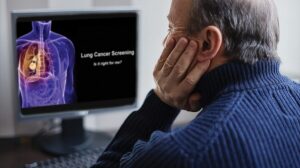by
John R. Fischer, Senior Reporter | February 21, 2023

Risk-based lung cancer screening models are more cost-effective and produce better outcomes, says a new study. (Photo courtesy of MD Anderson Cancer Center)
Under current U.S. Preventive Services Task Force recommendations, low-dose CT screenings are recommended in 50- to 80-year-olds with a 20 pack-year smoking history, who are currently smoking or have quit in the last 15 years.
Clinicians make decisions for this type of care based solely on age and smoking history, but the Cancer Intervention and Surveillance Modeling Network (CISNET) Lung Working Group, which includes the University of Texas MD Anderson Cancer Center, found that more advanced risk-based models may be more cost effective and result in more quality-adjusted life years (QALY).
In their study, the researchers used a simplified calculator that estimated six-year probability of developing lung cancer, and another for the probability of death within six years. Both incorporated age, smoking history and sex.



Ad Statistics
Times Displayed: 176966
Times Visited: 3201 For those who need to move fast and expand clinical capabilities -- and would love new equipment -- the uCT 550 Advance offers a new fully configured 80-slice CT in up to 2 weeks with routine maintenance and parts and Software Upgrades for Life™ included.
Lead author Dr. Iakovos Tomazis, assistant professor of health services research at MD Anderson Cancer Center, says the full calculator models include race and ethnicity, personal cancer history, family history of lung cancer, history of chronic obstructive pulmonary disease, emphysema or chronic bronchitis, educational attainment and body-mass index.
"If possible, all of these should be considered when determining who is at high enough risk to warrant lung cancer screening," he told HCB News.
Dr. Rafael Meza, the principal investigator of the CISNET Lung Working Group, says one challenge to implementing these models effectively is having access to all information required, as well as making sure all eligible patients get screened and adhere to recommended follow-up care and annual screenings.
While preliminary findings from ongoing real-world implementation, pilot trials, and studies report have shown it is possible to implement risk model-based programs, none of these assessments have been performed as yet in the U.S.
"My personal opinion is that if healthcare entities can provide evidence that risk model-based screening programs can be implemented effectively that should be enough," Meza told HCB News.
The findings were published in
Annals of Internal Medicine.

